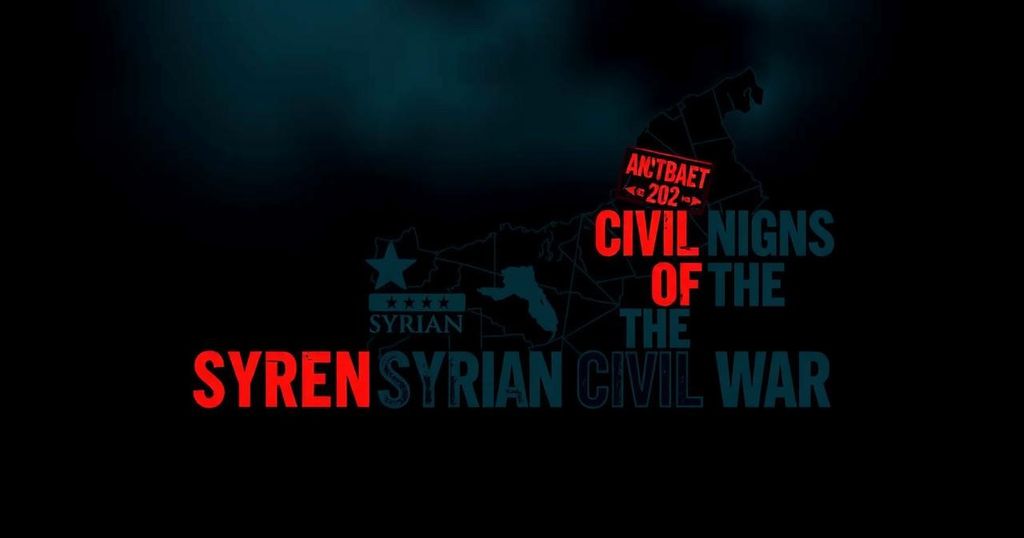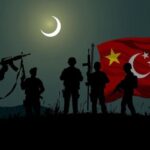The Ongoing Syrian Conflict: Seven Years Later
Seven years into the Syrian civil war, the conflict remains unresolved, involving multiple foreign powers including Russia, Iran, Turkey, and the U.S. Experts warn of intensified violence as Assad seeks to reclaim territories, and highlight the complex geopolitical stakes at play. Concerns grow over regional tensions, particularly involving Israel and Hezbollah, while the U.S. lacks a clear policy direction. The outlook for peace remains grim as the conflict evolves.
Seven years post the onset of Syria’s civil war, which began with an uprising against President Bashar al-Assad, the nation continues to grapple with violent conflict and significant geopolitical repercussions that involve various international stakeholders, including the United States, Russia, Turkey, and Iran, among others. Brookings experts recently provided a comprehensive analysis on the complexities surrounding the Syrian crisis, especially after the seventh anniversary of the conflict on March 15. Experts highlighted that Russia’s involvement has been pivotal since its military intervention in September 2015, ostensibly to tackle ISIS; however, the primary intent was to ensure the survival of the Assad government. Alina Polyakova emphasized, “From the outset, the Russian air campaign primarily hit non-ISIS targets” and noted the difficulties Russia faces in exiting Syria without leaving Assad vulnerable. Despite claims of victory over ISIS by President Putin, Pavel Baev noted that “Russian forces on the ground are still taking casualties,” revealing the ongoing instability. The Syrian conflict has also served as a battleground for Iran, Israel, and Hezbollah, with only increasing military tensions. Mara Karlin pointed out Israel’s heightened concerns regarding Hezbollah’s capabilities, and indicated that recent actions, such as the shooting down of an Iranian drone by Israel, could escalate into a larger conflict. Dror Michman and Yael Mizrahi-Arnaud conveyed that Israel has clearly communicated to European leaders a willingness to resort to military action if diplomatic measures fail. The United States’ role remains complex, with Itamar Rabinovich indicating a lack of a tangible exit strategy despite strong rhetoric against Iran. He contended that America’s presence, particularly its alliance with Kurdish forces, has limited influence in shaping Syria’s future. The way forward for the United States must critically evaluate whether counter-terrorism or broader geopolitical affairs should take precedence in policy formulation. Turkey’s intervention is partly attributed to inaction from the United States regarding chemical weapon use in Syria. Kemal Kirişci observed that Turkey’s strategy has particularly shifted toward opposing Kurdish forces along its border, which it perceives as a threat to its national security, thereby complicating its relationship with the U.S. Ranj Alaaldin underscored the risk of military confrontation between Turkey and America amidst these dynamics. In the current landscape, Brookings fellow Katy Collin highlighted a grim outlook for peace negotiations, asserting that the Assad regime appears set on reclaiming control of all rebel-held territories, which could lead to intensified violence against civilians. This power struggle indicates a diminishing likelihood of effective diplomatic solutions. Michael O’Hanlon criticized the Geneva process as ineffective, advocating for a more realistic approach that focuses on enabling autonomous governance in marginalized areas pending the transition of power. In sum, as the struggle in Syria continues unabated, it remains clear that a strategy for stabilization is imperative, albeit complicated by the ongoing regional power struggles. O’Hanlon remarked on the necessity of cooperation for reconstruction efforts, emphasizing an increased urgency for an effective framework amongst international actors invested in the region.
The Syrian civil war, which began in 2011, has evolved into a multi-faceted conflict involving various local, regional, and global powers. The ongoing strife has resulted in countless civilian casualties and has drawn the attention of international actors—most prominently the United States, Russia, Turkey, and Iran—each with divergent goals and strategies. The implications of this war stretch beyond Syria, affecting regional security and global geopolitical dynamics. As the conflict reaches its seventh year, analysis from experts provides insights into the roles and motivations of these players while assessing the prospects for peace and stability going forward.
In conclusion, the Syrian civil war remains highly complex, marked by continued violence and rivalry among significant international and regional players. Russia, Iran, and Turkey’s interests intersect in ways that complicate potential resolutions. The prospects for peace through negotiations appear bleak, as experts indicate a prevailing trend towards greater conflict rather than reconciliation. As stakeholders navigate their objectives, the urgent need for a coherent stabilization strategy is paramount to address both humanitarian needs and long-term regional stability.
Original Source: www.brookings.edu







Post Comment